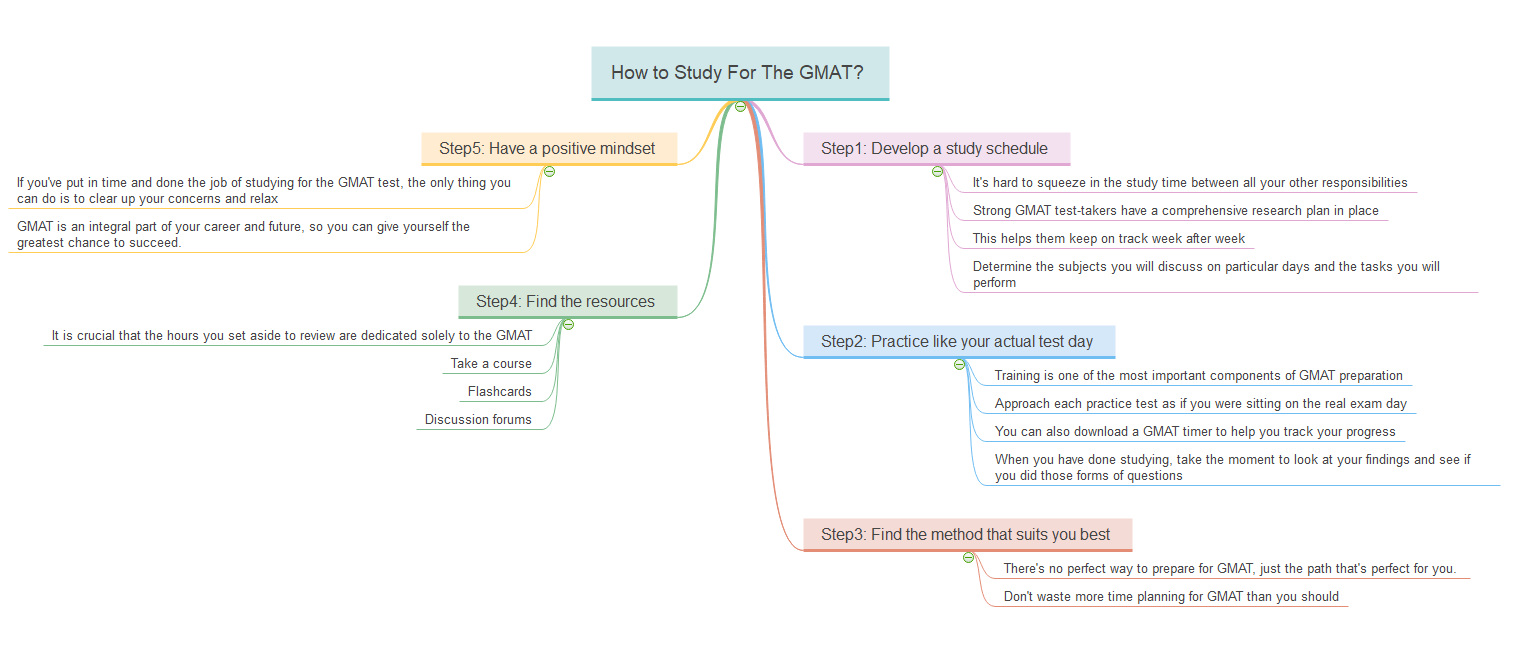A Complete Guide To GMAT Preparation

No one ever said that studying the GMAT was simple. In reality, it's considered that most MBAs spend two to three months training for it. The majority of students spend more than 50 hours studying, and the top scorer averages 121 hours of study time.
It's natural to be a little anxious about the GMAT test. Reduce the fear by entering the exam with a concrete strategy and carrying out the strategy. Get the best out of practice exercises and tools, consider how you improve, and remain motivated during the process. Just remind yourself that you've got what it takes. Like any other critical task, planning and hard work will pay off.
There is a simple five steps guide to help you study for the upcoming GMAT.

Source: EdrawMind
Step 1: Develop a study schedule
A lot of people studying for GMAT are either in school or have full-time jobs. It's hard to squeeze in the study time between all your other responsibilities, particularly if you've been out of school for a couple of years, and your learning skills have become rusty. You're going to have to devote hours a week to get a chance to raise the ranking.
Determine the subjects you will discuss on particular days and the tasks you will perform, such as answering practical questions or completing a full-length practice test.
To make sure that you achieve your work hour targets, you can take a careful look at your calendar and find hours that you should dedicate to studying. Ideally, you should set aside the same amount of time on the same days each week so that learning becomes a habit. This is how you can plan for the GMAT consistently.
Step 2: Practice like your actual test day
Training is one of the most important components of GMAT preparation. Approach each practice test as if you were sitting on the real exam day. This will help you get into the habit of concentrating for a more extended period, running at an acceptable speed, and keeping up your stamina. Instead of spending the same amount of time training for each section, you should give preference to your weak areas.
You can also download a GMAT timer to help you track your progress. When you have done studying, take a moment to look at your findings and see if you did those forms of questions. Your results will help you assess how your studies progress to see how you need to make changes while you move along.
Step 3: Find the method that suits you best
Good test-takers know their abilities and use them to optimize their time of testing and score well. There's no perfect way to prepare for GMAT, just the path that's perfect for you. You may feel that you need the consistency and discipline of a class or choose to learn better in a self-paced environment.
Hundreds of hours of preparation time would not add up to anything if you didn’t focus. Don't waste more time planning for GMAT than you should. The consistency of your time of study is just as critical as quantity.
Step 4: Find resources
The hours you set aside to review must be dedicated solely to the GMAT. But when you're getting up, turn off your work phone and don't check your messages. Find a quiet place at home where your family can't bother you. You want to remove any obstacles as soon as you can.
- Take a course - There are many courses available both online and offline to aid with GMAT prep.
- Flashcards - Flashcards are perfect for breaking down complex topics and are a great study aid for quick revisions.
- Discussion forums - There are multiple online discussion forums available to help you get in touch with GMAT experts.
Step 5: Have a positive mindset
If you've put in the time and done the job of studying for the GMAT test, the only thing you can do is to clear up your concerns and relax.
If you feel that you need to spend more time enhancing your flaws or total ranking, take a few days (or weeks) off work. GMAT is an integral part of your career and future, so you can give yourself the greatest chance to succeed.
You can find valuable services online and in person. Although achieving your top score is a great short-term incentive and has a huge effect on your future, learning how to alleviate stress is one of the best things you will do for yourself today, before GMAT, and for the rest of your life.
Getting ready for the GMAT exam can take time and hard work. It's also taking the right study plan. Respect your study schedule, know how to get the best out of the practice exercises, consider how you learn, and handle the method and evaluation with a cool, optimistic mindset. This is how you learn how to study for GMAT.
EdrawMind is an easy-to-use, flexible mind mapping tool designed to help you generate mind maps that are great for studying. By combining GMAT tests’ bullet points into a mind map, EdrawMind lets you organize the concepts and create a map to help you study.





